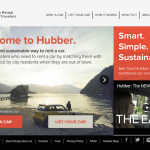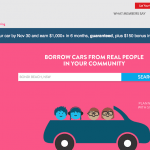Skift Take
Car rentals are also car sharing in this on-demand world and travelers love to share if it means convenience and cost-saving.
 Car rental companies say they haven’t felt any pain from the ascent of new car rental startups or peer-to-peer car rental apps, but that argument seems unreasonable. For decades car rental companies have survived off their model of situating themselves at airport or central downtown locations where it’s ideally easy to reach their customer base when they first arrive in a destination. Fast forward to 2015 and the concept of a brick and mortar car rental desk or facility, though not abandoned, isn’t as tangential as it once was.
Car rental companies say they haven’t felt any pain from the ascent of new car rental startups or peer-to-peer car rental apps, but that argument seems unreasonable. For decades car rental companies have survived off their model of situating themselves at airport or central downtown locations where it’s ideally easy to reach their customer base when they first arrive in a destination. Fast forward to 2015 and the concept of a brick and mortar car rental desk or facility, though not abandoned, isn’t as tangential as it once was.
Now travelers can order a rental car on-demand and have it brought to their current location, or rent out a car from someone living nearby their hotel or accommodation, and don’t forget about on-demand apps like Uber or Lyft as other alternatives. Car rentals are still rentals, but they’ve also evolved into car-sharing, and these five startups understand what it means to share and meet travelers where they need them most.
>>Hubber help travelers who need to rent a car by matching them with cars rented out by city residents when they’re out of town.
SkiftTake: Hubber’s price point is about the same as renting from a legacy car rental company and not having to fill up the tank on your way back to the drop-off facility shows the company has a little humanity.
>>Skurt is a rental car mobile app service founded earlier this year that brings on-demand cars to travelers and consumers. So far it’s available at Los Angeles International Airport and plans to launch at San Francisco International Airport soon. Skurt also offers roadside assistance.
SkiftTake: Skurt’s model of delivering a rental car on-demand is really what travelers of 2015 are looking for. If they arrive in a destination without rental car plans and get a day or two into a trip and realize they need a rental car, but may be far away from a rental facility or airport, they now have on-demandification for this situation.
>>FlightCar allows travelers to park at an airport to rent out their cars to other travelers. Owners get free airport parking and renters choose from a wider selection of vehicles that FlightCar claims are available at lower prices than those offered by the major car rental companies. So far it’s available at 17 U.S. airports.
SkiftTake: FlightCar’s real challenge is it doesn’t make getting a car at an airport cheaper or easier enough than a traditional car rental to get people to switch. It’s an idea looking for a use case and finding none, in addition to the company facing leadership issues.
>>Car Next Door is a peer-to-peer car-sharing network in Australia and is based in Sydney. Car owners can list their cars and travelers can book a car to rent through a mobile app and Car Next Door offers varying tiers of monthly plans.
SkiftTake: Offering various monthly plans is necessary for a model like Car Next Door’s, but many travelers don’t want to be locked into a monthly plan if they’re not planning on getting their monies worth.
>>Getaround is a mobile app and a peer-to-peer car sharing marketplace enabling car owners to rent out their cars to travelers. Rates start at $5/hour including insurance and no membership fees.
SkiftTake: This is essentially like Spinlister for cars, and doesn’t follow the model of car owners being out of town when they’re renting out cars. Like any other sharing service, its success depends on car owners’ comfort level with letting strangers rent their (very expensive) property.
For all of our SkiftSeedlings coverage, check out our archives here.
The Daily Newsletter
Our daily coverage of the global travel industry. Written by editors and analysts from across Skift’s brands.
Have a confidential tip for Skift? Get in touch
Tags: skiftseedlings, startups





